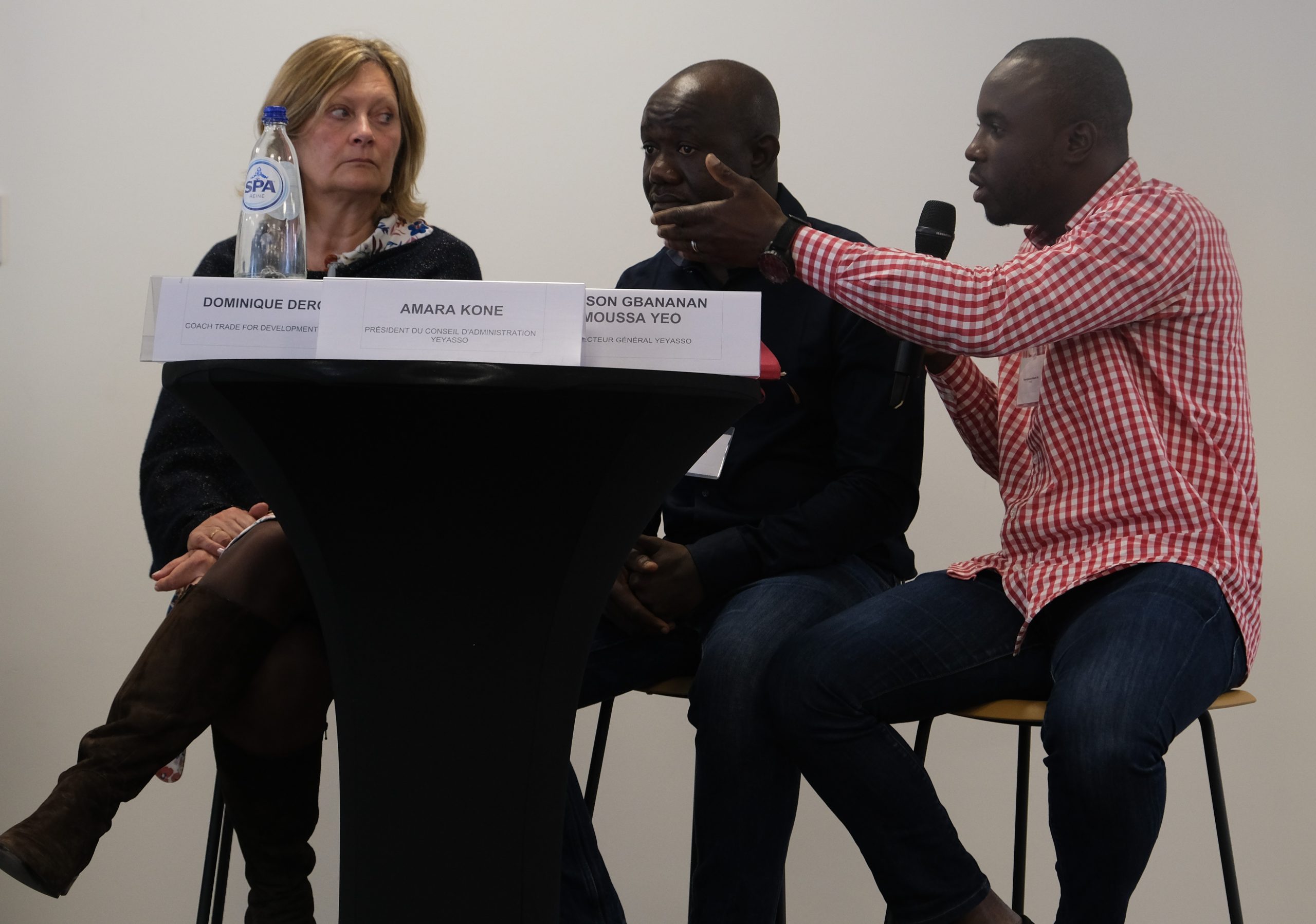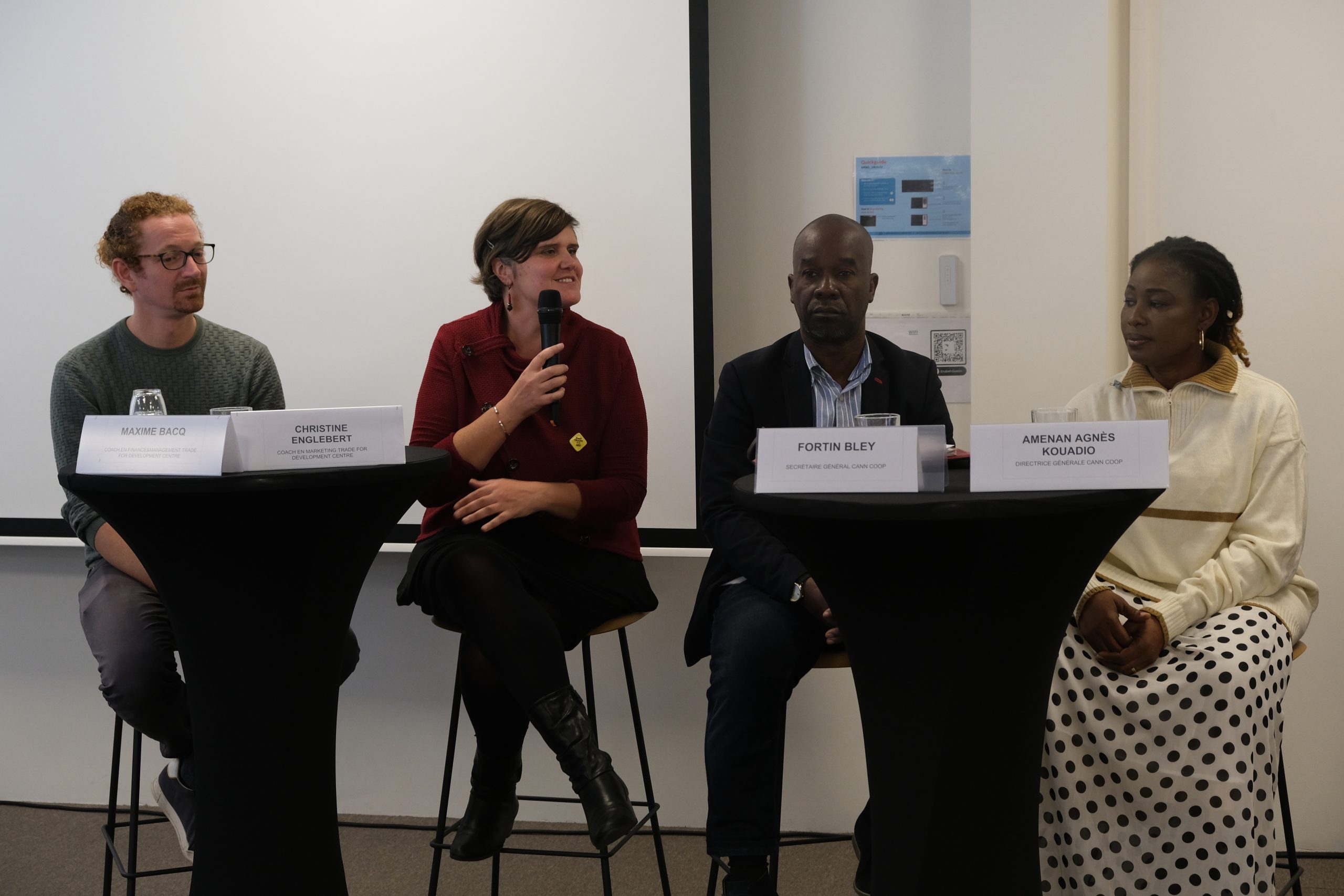Cocoa cooperatives in Côte d’Ivoire have been receiving coaching from Enabel’s Trade for Development Centre (TDC) for many years. What challenges are these cooperatives facing? How does coaching work in practice? How can we increase its impact on the whole sector? These were the topics discussed by producers and coaches during a round table in Brussels.
On 25 October 2022, we came together with representatives of Côte d’Ivoire cocoa cooperatives and coaches in the offices of the Belgian development agency Enabel. The cocoa sector is facing a whole string of problems related to sustainable and fair trade. The sector provides a good indication of the impact that TDC’s coaching programme can have in Africa.

TDC Marketing Coaching Programme Officer Mathieu Desantoine highlights the fact that TDC organises fair and sustainable trade activities in both the North and the South. “In Belgium, it is mainly about information and raising awareness. In the African partner countries, TDC also supports communication and promotional activities relating to sustainable trade, and coaches local entrepreneurship focusing on fair and sustainable trade. By strengthening the management and marketing of cooperatives, TDC aims to provide them with better access to markets and financing. This should enable them to expand the services to their members, increase their turnover and ultimately improve the producers’ income and quality of life.”
Cooperatives with a lot of potential
The on-site coaching offered by TDC is tailored and adapted to the needs and opportunities of the specific cooperative being supported. On the one hand because the work involves sensitive data that is not to be shared with competitors. And on the other hand because it is a participatory process of co-creation featuring techniques that make use of the available collective intelligence. “Most of the organisations being supported in Côte d’Ivoire were founded around 2010 as cooperatives, so they are relatively young, which influences the dynamics and management and makes certain topics more complicated,” says Maxime Bacq, TCD finance and management coach.
In the period 2020–2022, 34 organisations in Africa, including 12 in Côte d’Ivoire, received financial and organisational management and marketing coaching on the core elements of entrepreneurship: business plan, financial management, inventory management, human resources, strategic positioning, visual identity, negotiation, communication, etc. Some also received a grant to carry out activities in line with the strategy. “These cooperatives were chosen based on their strong (!) potential in terms of social impact, financial sustainability and/or economic growth,” explains Mathieu Desantoine. “Because when a success story becomes a reality, the whole sector benefits.”
To increase the impact on the sector, TDC also helps ‘Business support organisations’, i.e. business support service providers, including three in Côte d’Ivoire. “There are a lot of trainers and consultants in the country, but very few coaches, mentors and facilitators. Hence the importance of working on this with existing teams and building capacity, because the potential is there!” says Mathieu Desantoine.
A ‘Train the trainers’ strategy is also being rolled out. This is about coaching that local potential: members or people close to the cooperatives who can work with the TDC coaches on favourable terms and strengthen the effect of the coaching on the target groups. For a pilot project, a duo (international coach + local coach) was formed for marketing coaching in Côte d’Ivoire. The complementarity of skills, knowledge and experience was a success. Definitely worth repeating!
Building relationships and engagement
The cooperatives receiving TDC coaching felt that the sessions were positive in many ways.
“It has a positive effect,” says Fortin Bley, general secretary of Cann Coop and president of the Ivorian Fair Trade Network (RICE). “Before Enabel’s coaching, our member numbers were declining. We had dropped from 800 producers to 300 and couldn’t reverse the trend. Thanks to the coaching, we’ve implemented a strategy based on transparency and mobilisation that allows us to regain lost members and attract new ones. We now have more than 835 members! In terms of organisational management, we’ve been able to solve a number of local problems, including deforestation, and increase our production as a result.” Amenan Agnès Kouadio, general manager of Cann Coop, illustrates this result in figures: “From 50 tons of cocoa in October 2021, we’ve now increased to 200 tons!”
Christine Englebert, TDC marking coach, adds: The big marketing challenge is often more internal than external, because the cooperative’s first customers are its members. We therefore analyse how they function, where they are active and where they are not active enough, the way in which they share or don’t share information, any problems and tensions, the needs they encounter, etc. This exchange of information is the input and a way to involve them in the change process. We never position ourselves as experts who diagnose the issue, then find and implement solutions. Instead, our role is to facilitate reflection, generate momentum and to find solutions together. It is a co-creation process that will lead to the implantation of solutions. The same applies to external communication: the approach is interactive. An advantage of tailoring the approach!
Certification and diversification
Marketing coaching also enables cooperatives to focus on their strengths and prepare for prospecting. “The communication exercise has made us realise that we shouldn’t wait for partners to come to us, but that it is up to us to approach them, especially by taking part in key events,” confides Yesson Gbananan Moussa Yeo, General Manager of the Yeyasso cooperative. “Thanks to the TDC coaching, we have professionalised various aspects of our cooperative such as the analysis of financial and commercial data, the creation of partnerships (including with the Galler chocolate factory), the cohesion of the team (managers, staff, members), etc. We also received coaching for our Fairtrade and organic certification, which has improved the quality of our cocoa and flavours! And we received support for our agroforestry and diversification projects. These are all advantages that we want to keep within our organisation and at the same time make available to partner organisations.” TDC coach Dominique Derom concludes: “Those are the benefits of long-term coaching! All this progress is possible because Yeyasso has been receiving this coaching since 2017. And there are more projects planned…”

Certification and diversification are challenges that many cooperatives in Côte d’Ivoire face during their development! “Picking up rules and principles isn’t always easy for cooperatives that are still relatively young,” emphasises Maxime Bacq. “Not to mention the operational and financial uncertainties that cooperatives have to face. Certificates can lead to a certain degree of customer dependence. It’s often the case that customers almost unilaterally decide on the quantities of certified cocoa to be purchased, with the result that it’s not until the beginning of the season that the cooperatives finally discover whether they can add value to part or all of their production. The profit margins on the sale of non-certified cocoa are approximately 7–8% gross and 1–2% net. This isn’t enough to grow. That requires a large cash flow, but these organisations are often not very strong. Hence the desire to diversify! Through certification, but not exclusively. Other opportunities being explored are growth, by having more members and by producing more; integration of activities in the value chain (processing, logistics, etc.); and offering other products (upgrading organic waste, fertiliser, biogas, etc.).”
From idea to market
During the round table, there was particular interest in the diversification support that TDC offers. This enables producers to diversify their sources of income and therefore increase the chance of dignified living conditions for themselves and their families. How do you choose which products are worth building on? How can their sales potential be determined in light of the constraints faced by cooperatives and the specific market characteristics? “Market research needs to be carried out,” emphasises Dominique Derom, process supervisor at Yeyasso. “When diversification seemed appropriate, we investigated the various possible directions with the management of the cooperative. We also consulted the producers and their families: their opinion is crucial because they are the ones who will grow the products. We then contacted the village chiefs to see which products they might be interested in. Some preferred cassava, others rice, maize or poultry. Once this shortlist had been drawn up, the options had to be explored with the National Agency for Rural Development Support. All this information led to Yeyasso’s choice to grow cassava and rice because it met the needs of the producers, but also the local, regional and even international market through Burkina Faso.”

Christine Englebert: “When we talk about diversification, we have to ask ourselves whether we want to develop a service for the members or whether we want to strengthen the cooperative economically. Depending on the answer, the diversification will be very different. If we want to ensure that producers who live purely off cocoa have a certain amount of food autonomy and access to other types of income all year round, we will encourage small-scale entrepreneurship and introduce oranges and cassava into their plantations using member groups. For example, we will encourage women’s groups that produce soap to sell it locally without having to deal with the complexities of an international market or a more formalised market, in order to quickly generate a small income.
When it comes to a cooperative that wants to diversify to become economically stronger, the challenge is, for example, to combine cocoa with another important export product for Côte d’Ivoire, such as palm oil or rubber.
Whichever option is chosen, it would be an illusion to believe that diversification can be completed in one or two years. It really is a commitment that the cooperative must make for the very long term.” But which, if handled smartly, can provide good development prospects.
Allison Lefevre


